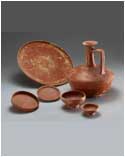

On July 15, 1099 Jerusalem was captured by the Crusaders. This culminating event of the First Crusade coincided with the establishment of the Crusader Kingdom of Jerusalem. Frankish rule in the Holy Land lasted for a period of about two hundred years and came to an end in 1291 with the conquest of Acre, and the consequent capitulation and abandonment of the last Crusader strongholds in Beirut, Tyre, Sidon and ‘Atlit.
The Crusader Kingdom redefined the political, religious, economic and social situation for the country and its inhabitants. For the first time since theRoman period the country gained political independence. Moreover, the very nature of it as the "Holy Land” made the kingdom of extreme importance for Christendom – a religious center and focal point for extensive pilgrimage; a principal center in the international trade network between East and West; and a destination for European settlement, particularly of clergy, warriors and nobility.
The changes in the status of the country fostered economic prosperity, alongside wide-scale development manifested in military, administrative and religious construction. Fortresses, citadels and towers were erected the length and breadth of the country, and not only in the border regions and contested areas. Hundreds of churches were built and integrated into every Crusader settlement. Some, such as the Church of the Holy Sepulcher in Jerusalem, are monumental in size and magnificence. The coastal cities from Ashkelon in the south to Beirut in the north were strengthened, and became centers of international commerce.
The decline of the Crusader Kingdom, until its ultimate destruction, was accompanied by numerous battles and confrontations with Ayyubid and Mamluk forces, resulting in the devastation of the entire network of urban settlements.
|







